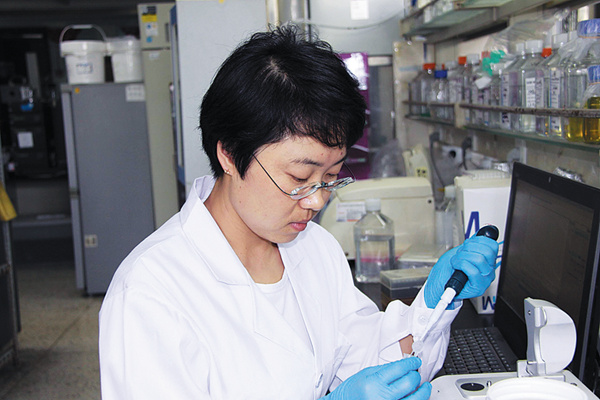

Dedication and determination prove winning combination as she leads a committed team tackling COVID-19, Yuan Quan and Zhou Zhou report.
The proverb "great power in small things" has a great many applications, but it very aptly describes Wang Qihui, a petite Chinese woman who has taken on a challenging mission: to develop new antibody drugs that can defeat COVID-19.
Since January 2020, when Wang first volunteered to work on COVID-19, the virologist at one of China's top academic institutions has been racing against the clock to find ways of defeating the deadly virus. Her efforts have yielded significant results, although she continues to conduct research on further solutions.
Wang, 37, works at the Institute of Microbiology, affiliated to the Chinese Academy of Sciences, in the north of Beijing. Her office is a bright room filled with books, simple furniture and a light floral fragrance. It could be mistaken for business premises, were it not for the white-coated personnel walking around the laboratory opposite.
Over the past two years, Wang has led her laboratory team in conducting research on the development of reagent testing, neutralizing antibodies and recombinant vaccines. She has worked around the clock, often foregoing food and sleep.
Tasked with finding effective antibodies in a short time, Wang conducted experiments day and night, and for half a month, she didn't leave the lab at all. Whenever she could not continue, she would collapse in a chair for a few hours.
"I felt like I had died," Wang says, recalling the early days of the pandemic.
Her painstaking efforts were not in vain. Five months after the novel coronavirus first broke out, her team announced that JS016, the neutralizing antibody against COVID-19 that they had developed, had entered human testing following approval by China's drug regulator. It was the world's first monoclonal antibody targeting COVID-19 to be administered to healthy people in clinical trials.
In November, the antibody was granted emergency use authorization in 15 countries, including the United States and several European countries.
It was only then that Wang was relieved of the great mental pressure she had been under. In the early days of the pandemic, the pressure had been amplified by publicly stated doubts regarding Chinese scientists. Feeling aggrieved by such views, she was determined to accelerate her research and take the lead in the global race to defeat the virus.
Aside from all the hard work, Wang attributes her achievements in COVID-19 research largely to her previous experience in the field of viral infectious diseases. After obtaining her doctorate in 2012, Wang joined the Institute of Microbiology and participated in the research on Middle East respiratory syndrome, also known as MERS.Four years later, she completed the mission of isolating antibodies from the blood of patients who had recovered from the Zika virus.
Over the past 10 years, she has published dozens of papers in the world's leading academic journals and translated an English-language science book. Wang's work brought her wide acclaim and a host of accolades.